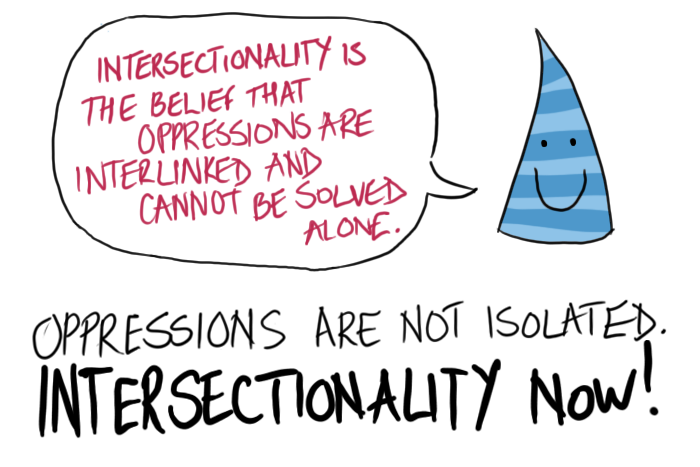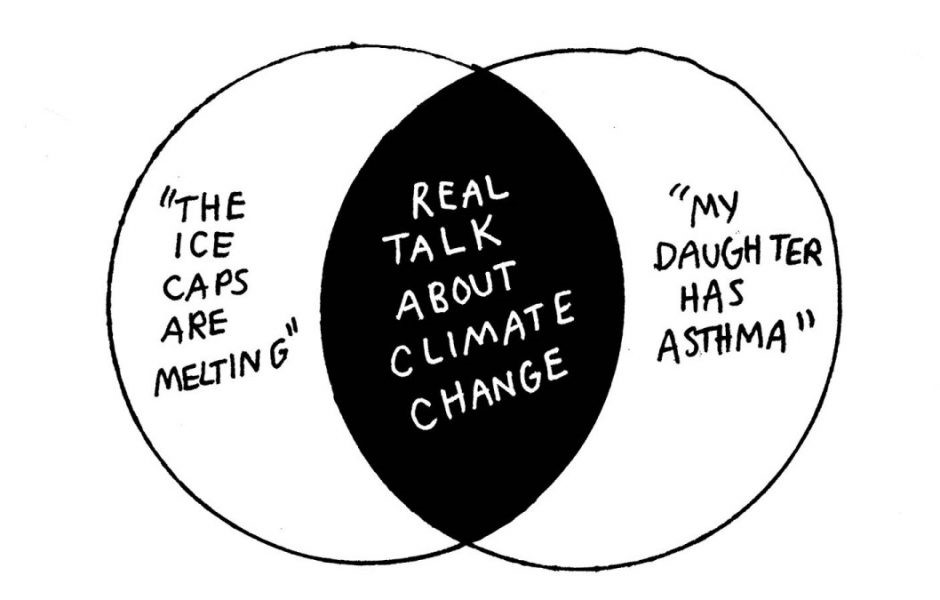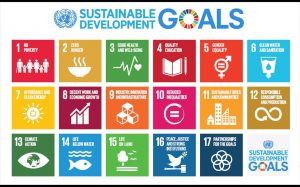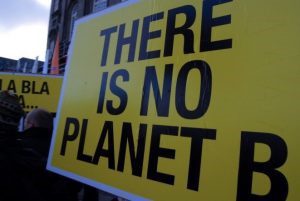This guest blog comes from Sarah Gold, MSc student, studying Sustainable Cities.
Why environmentalism needs to be intersectional
On 28th May, three days after the murder of George Floyd, climate activist Leah Thomas shared a post on Instagram which quickly went viral, popularising the term ‘intersectional environmentalism’, a type of environmentalism which takes into account the ways in which social and environmental justice overlap. In this blog, I explain why an inclusive, anti-racist approach is vital to the environmental and climate justice movement and where we can all learn more.
What is intersectional environmentalism?
‘Intersectionality’ was coined in 1989 by Kimberlé Crenshaw, an American lawyer, civil rights advocate and leading scholar of critical race theory. The term describes how multiple forms of injustice, such as racism, sexism, ableism and countless others, overlap or ‘intersect’ with each other. These inextricably linked systems of oppression present in our society mean that some individuals will simultaneously face several sources of discrimination.
For instance, as a woman I will inevitably confront sexism throughout my lifetime, however due to my white and other privileges, there are many other forms of oppression that I do not have to face on a daily basis.
Intersectional environmentalism, then, is the concept that environmental issues do not exist in a vacuum, but cross paths with other forms of injustice. According to Leah Thomas, it is defined as “an inclusive version of environmentalism that advocates for both the protection of people and the planet. It identifies the ways in which injustices happening to marginalised communities and the earth are interconnected. It brings injustices done to the most vulnerable communities, and to the earth, to the forefront and does not minimise or silence social inequality. Intersectional environmentalism advocates for justice for people + planet”.
Intersectionality is a powerful tool to connect environmental activists with other social movements such as feminism, Black Lives Matter (BLM) and LGBTQ+. Working together helps to amplify each movement’s voice and create meaningful long-lasting change.
Why is intersectional environmentalism important?
In the past, environmentalism has typically been associated with and dominated by white, middle-class males. At best, this means mainstream environmental movements and NGOs have too often shied away from acknowledging the racial dimension of issues such as air and water pollution; at worst, this can mutate into ‘ecofascism’, a disturbing white supremacist ideology that considers racial purity to be the solution to environmental problems.
The danger of ecofascism was clearly demonstrated in 2019 when two of its adherents committed public shootings in El Paso, Texas and Christchurch, New Zealand. Opening up the environmental movement to all races and minorities and educating ourselves on racism are necessary steps to address this problematic past and present, and the privilege associated with participating in environmental struggles.
Whilst white people are more likely to be able to afford a ‘sustainable lifestyle’, minorities are more likely to be on the frontline of the worst environmental problems. The environmental justice movement that emerged in the late 1970s in the USA first drew attention to the disproportionate environmental burdens borne by economically disadvantaged and minority communities.
In 1976, the ‘Love Canal’ case gained international media coverage for having caused significant detrimental health effects in residents of a working-class area in Niagara Falls, New York that had been built on top of a toxic landfill site. This was the first well-documented example amongst many of the increased exposure to polluted and noxious environments experienced by minorities.
A study in 2016 showed that London’s black, African and Caribbean communities are disproportionately exposed to air pollution, and are more likely than white people to breathe in illegal levels of nitrogen dioxide, a harmful pollutant responsible for increased rates of respiratory problems, particularly asthma in children.
Climate change is no exception to this trend. The climate crisis will – and already is – increasing both global and local inequality. The effects of climate change will hit hardest those least responsible for global warming in the Global South. Australia being the only exception, countries with lower GDPs will warm the most. The effects will be also felt disproportionately by marginalised communities in the Western world.
Non-white people are currently experiencing the worst environmental problems in our world. In the U.S., Black and brown communities are more likely to live near toxic waste sites, live in communities with fewer environmental amenities, be harmed by climate change, inhale fine particulate matter and more. Globally, indigenous people and people living in island nations and Central Africa are facing the brunt of climate change and waste dumping. Likely due to this first-hand experience, a recent study found that Black and Latinx people are much more concerned about climate change than white people. Witnessing the toll of environmental issues can help environmentalists more fully understand the problems we’re facing and share in these communities’ concerns. And amplifying stories from these minority communities can hopefully convince policymakers that these environmental issues are real and deserving of immediate attention.
The book ‘Why Women Will Save the Planet’ highlights how women are likely to be most adversely affected by climate change too, particularly in poor and marginalised communities in developing countries, since they often depend on climate-sensitive livelihoods such as agriculture, securing water, food and fuel, and are often the last to evacuate their homes when natural disasters strike, leading to higher mortality rates.
Although these are just a handful of examples of the manifold ways in which minorities are more likely to suffer the consequences of environmental crises, it illustrates the importance of adopting an intersectional approach – it is impossible to extricate them from socioeconomic issues. It is worth reminding ourselves that sustainable development, the holy grail of many environmentalists and human geographers, is based not just on environmental, but economic and social sustainability too.
Where can I learn more about intersectional environmentalism?
As a white environmentalist, it is more important than ever to ‘do the work’ and hold myself accountable! Here are some incredible intersectional and anti-racism environmentalists that have inspired and educated me so far.
- Leah Thomas, @greengirlleah, shares informative content on climate justice and intersectional environmentalism, the term she popularised online.
- Check out the Intersectional Environmentalist platform which Leah co-founded. It’s a website full of information on how to dismantle systems of oppression in the environmental movement, with resources aimed at a growing number of communities (at the moment it includes Black, Latinx, U.S. Indigenous, LGBTQ2S+, South Asian and allies).
- Pattie Gonia, @pattiegonia, who describes himself as an “intersectional environmentalist, ally-in-progress and fetus drag queen” is also one of the co-founders of the Intersectional Environmentalist platform and has some great content on allyship.
- Mikaela Loach aka @mikaelaloach uses her voice on Instagram to talk about inclusivity in sustainability as well as anti-racism, anti-ecofascism and feminism. She is also co-host of the brilliant @theyikespodcast which I highly recommend! Their episodes have covered topics including the links between coronavirus and ecofascism, fast fashion, BLM, and going beyond white environmentalism.
- You can also find Marie Beecham at @wastefreemarie for actionable tips for zero-waste living and information on climate and racial justice.
- Who doesn’t love a good TED talk? Check out Kimberlé Crenshaw’s TED talk on intersectionality, for a great 20 minute introduction to the concept. And if you’ve got just 7 minutes to spare, watch 17-year old youth striker Isra Hirsi’s TED talk on being the ‘Angry Black Girl’ in the climate justice space.
Please feel to add to this list, share with others and start conversations with your friends and families!






 st a quick reminder that we have the next Socially Responsible Investment Review Committee Forum tomorrow evening from 5pm to 7pm. It will be at S-2.08 at the Strand campus and will be an opportunity to hear what is happening in the world of King’s investment policy which involves ethical and sustainability issues such as fossil fuel companies. This is also a chance to have your voice heard on the topic.
st a quick reminder that we have the next Socially Responsible Investment Review Committee Forum tomorrow evening from 5pm to 7pm. It will be at S-2.08 at the Strand campus and will be an opportunity to hear what is happening in the world of King’s investment policy which involves ethical and sustainability issues such as fossil fuel companies. This is also a chance to have your voice heard on the topic.






